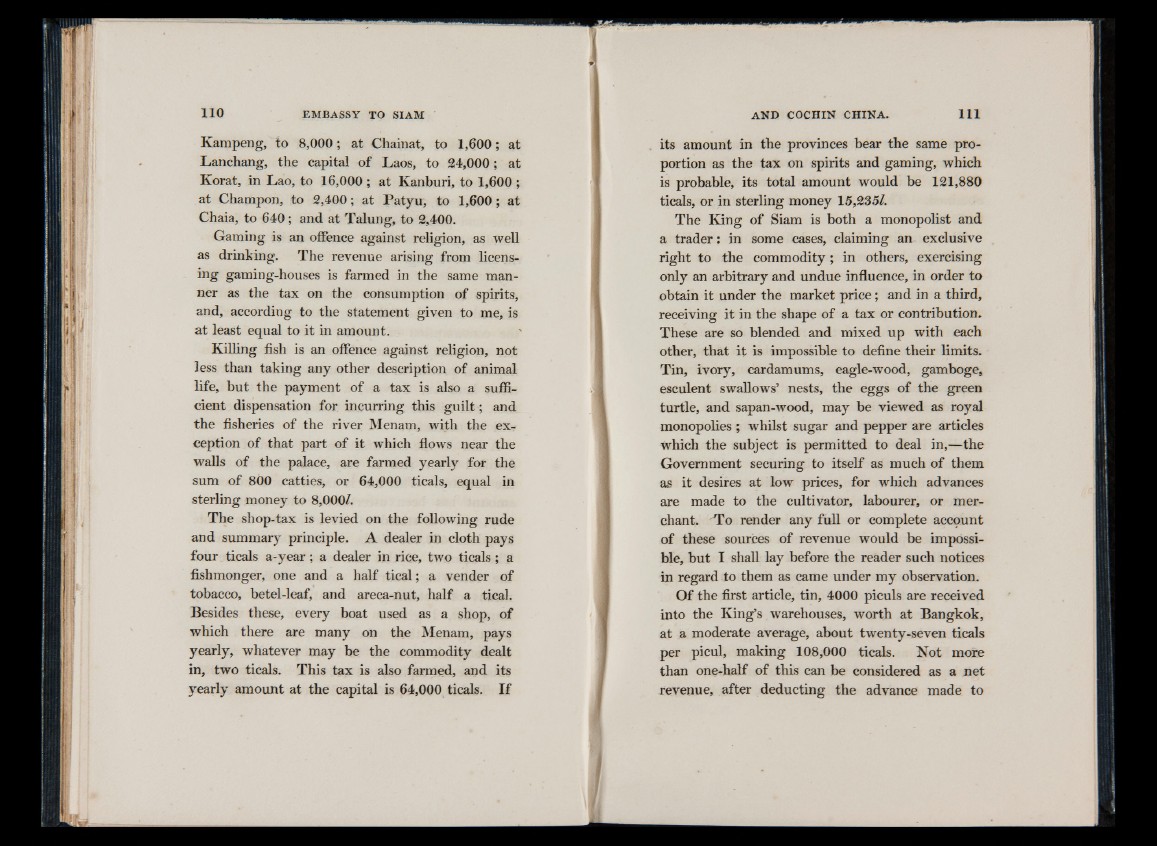
Kampeng, to 8,000; at Chainat, to 1,600; at
Lanchang, the capital of Laos, to 24,000; at
Korat, in Lao, to 16,000 ; at Kanburi, to 1,600 ;
at Champon, to 2,400; at Patyu, to 1,600; at
Chaia, to 640; and at Talung, to 2,400.
Gaming is an offence against religion, as well
as drinking. The revenue arising from licens-
ing gaming-houses is farmed in the same manner
as the tax on the consumption of spirits,
and, according to the statement given to me, is
a t least equal to it in amount.
Killing fish is an offence against religion, not
less than taking any other description of animal
life, but the payment of a tax is also a sufficient
dispensation for incurring this guilt ; and
the fisheries of the river Menam, with the exception
of that part of it which flows near the
walls of the palace, are farmed yearly for the
sum of 800 catties, or 64,000 ticals, equal in
sterling money to 8,000/.
The shop-tax is levied on the following rude
and summary principle. A dealer in cloth pays
four ticals a-year; a dealer in rice, two ticals ; a
fishmonger, one and a half tical; a vender of
tobacco, betel-leaf, and areca-nut, half a tical.
Besides these, every boat used as a shop, of
which there are many on the Menam, pays
yearly, whatever may be the commodity dealt
in, two ticals. This tax is also farmed, and its
yearly amount at the capital is 64,000 ticals. I f
its amount in the provinces bear the same proportion
as the tax on spirits and gaming, which
is probable, its total amount would be 121,880
ticals, or in sterling money 15,235/.
The King of Siam is both a monopolist and
a trader: in some cases, claiming an exclusive
right to the commodity; in others, exercising
only an arbitrary and undue influence, in order to
obtain it under the market price; and in a third,
receiving it in the shape of a tax or contribution.
These are so blended and mixed up with each
other, that it is impossible to define their limits.
Tin, ivory, cardamums, eagle-wood, gamboge,
esculent swallows’ nests, the eggs of the green
turtle, and sapan-wood, may be viewed as royal
monopolies ; whilst sugar and pepper are articles
which the subject is permitted to deal in,—the
Government securing to itself as much of them
as it desires at low prices, for which advances
are made to the cultivator, labourer, or merchant.
'To render any full or complete account
of these sources of revenue would be impossible,
but I shall lay before the reader such notices
in regard to them as came under my observation.
Of the first article, tin, 4000 piculs are received
into the King’s warehouses, worth at Bangkok,
at a moderate average, about twenty-seven ticals
per picul, making 108,000 ticals. Not more
than one-half of this can be considered as a net
revenue, after deducting the advance made to